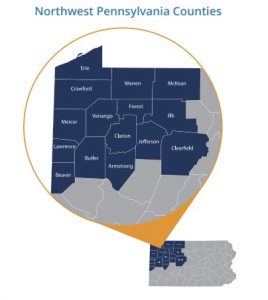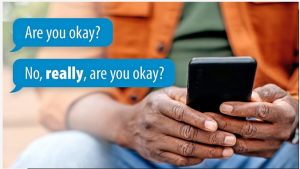 The Northwest Pennsylvania (NW PA) Veteran Suicide Prevention Program operates on a three-pronged approach involving healthcare providers, community organizations, and Veterans and their families in the 15 counties of NW PA. Because of this focus, we want to share this recent story by VA about suicide prevention and the signs to be aware of that may indicate a family member or friend is experiencing a mental health crisis.
The Northwest Pennsylvania (NW PA) Veteran Suicide Prevention Program operates on a three-pronged approach involving healthcare providers, community organizations, and Veterans and their families in the 15 counties of NW PA. Because of this focus, we want to share this recent story by VA about suicide prevention and the signs to be aware of that may indicate a family member or friend is experiencing a mental health crisis.
If you have any questions or would like to speak with someone about publicizing the NW PA Veteran Suicide Prevention Program in your community, please reach out to us.
Read time: 3 minutes
Written by Matthew Miller, Executive Director, VA Suicide Prevention
View the original article on VA’s website
Although we were trained to keep our cool in stressful situations, it’s still tough when we face them. After you get out of the military, the situations themselves may change. Dealing with tough times usually doesn’t get any easier.
One example is knowing what to do if someone you served with is talking about suicide. The key is being prepared and knowing how to respond with care and compassion. You can play a crucial role in providing support and making a difference in a Veteran’s life.
How to recognize a crisis
 Some actions and behaviors can be a sign a Veteran needs help:
Some actions and behaviors can be a sign a Veteran needs help:
- Crisis signs: These require immediate attention. If you or a Veteran you know are experiencing any of these and need medical attention, call 911.
- Thinking about hurting or killing themselves right now
- Looking for ways to kill themselves immediately
- Talking about death, dying or suicide
- Engaging in self-destructive behavior, such as drug abuse, risky use of weapons, etc.
- Warning signs: These may indicate a Veteran needs help. If you or a Veteran you know are experiencing any of these, Dial 988 then Press 1 to contact the Veterans Crisis Line.
- Appearing sad or depressed most of the time
- Feeling hopeless
- Experiencing anxiety, agitation, sleeplessness or mood swings
- Feeling as if there is no reason to live
- Feeling excessive guilt, shame or a sense of failure
- Experiencing rage or anger
- Engaging in risky activities without thinking
- Increasing alcohol or drug misuse
- Losing interest in hobbies, work or school
- Neglecting personal welfare and appearance
- Withdrawing from family and friends
- Showing violent behavior, like punching a hole in the wall or getting into fights
- Giving away prized possessions
- Getting affairs in order, tying up loose ends or writing a will
Knowing what to say
 You can support a Veteran going through a difficult time. Here are some things to keep in mind:
You can support a Veteran going through a difficult time. Here are some things to keep in mind:
- Make supportive and encouraging comments, but don’t ask invasive personal questions.
- Don’t inject judgment or emotion into the conversation. Stay calm.
- Listen more than you speak. Don’t dominate the conversation.
- Remind them you are there for them.
- Let them decide how much to share.
- The first step in determining how you can best help someone struggling is to ask, “Are you thinking about suicide?” If they answer yes, then providing an appropriate level of support and connecting them with resources is the next step.
If they answer no, it’s important to follow up with them and help them with what they need. Asking directly and non-judgmentally will not put the idea of suicide into their head. Instead, they will know they can rely on you if suicide is ever a concern for them.
Here’s an example of a possible conversation with a Veteran who is talking about suicide:
Veteran: “I can’t go on. My life has no purpose.”
You: “I’m really sorry you’re feeling this way. I might not be able to understand exactly what you’re going through or how you feel but I care about you and want to help. Have you thought about reaching out to the Veterans Crisis Line? Responders are available 24/7 and they’re trained to help you through this challenging time. We can call together if you’d like. I’m here for you.”
The Veterans Crisis Line offers free, confidential support. You don’t have to be enrolled in VA benefits or health care to connect. To reach responders, Dial 988 then Press 1, chat online or text 838255. Get more information about the Veterans Crisis Line.
Remember: If you believe a Veteran is at high risk of suicide and has already taken pills or harmed themselves, call 911. Above all, keep yourself safe. Never negotiate with someone who has a firearm. Get to safety and call 911, noting the Veteran is armed.
How to handle concerning social media posts
 If you use social media platforms, it’s vital to know what to do if you notice content that makes you concerned for a Veteran. Here are steps you can take if you notice a Veteran showing signs of emotional distress on social media:
If you use social media platforms, it’s vital to know what to do if you notice content that makes you concerned for a Veteran. Here are steps you can take if you notice a Veteran showing signs of emotional distress on social media:
- Shift the conversation to a non-public-facing tool
- Validate their feelings
- Find common ground
- Be authentic and conversational
- Provide resources for support
For more information and sample posts for each step, check out VA’s Social Media Safety Toolkit.
Everyone has a role to play in suicide prevention
When responding to a Veteran facing challenges, the most important thing to remember is you don’t have to be an expert, you just need to show you care. By asking a Veteran if they’re thinking about suicide, listening non-judgmentally and connecting them with resources and support, you could be saving their life.
Looking to Get Involved?
 Whether you identify as a healthcare provider, community organization, or Veteran, there are several opportunities through the NW PA Veteran Suicide Prevention Program and PERU to connect to resources, participate in educational training, and promote harm reduction strategies. We are actively recruiting healthcare and community partners to work with us in meeting our goals and objectives. To learn more, visit the program website at theresilientveteran.org.
Whether you identify as a healthcare provider, community organization, or Veteran, there are several opportunities through the NW PA Veteran Suicide Prevention Program and PERU to connect to resources, participate in educational training, and promote harm reduction strategies. We are actively recruiting healthcare and community partners to work with us in meeting our goals and objectives. To learn more, visit the program website at theresilientveteran.org.
Need Help? Know Someone Who Does? Contact the National Suicide Prevention Lifeline at 988 or use the online Lifeline Crisis Chat. Both are free and confidential. You’ll be connected to a skilled, trained counselor in your area.

